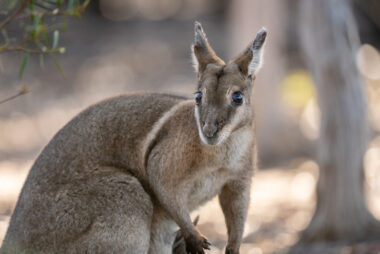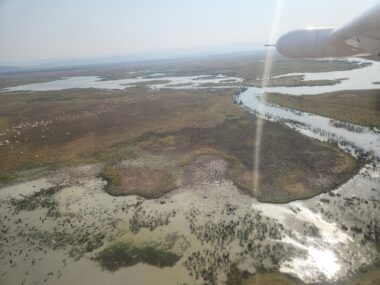The Great Barrier Reef experiences the highest level of heat stress ever recorded, research shows bleaching and mortality at previously unaffected locations.
The National Oceanic and Atmospheric Administration (NOAA) and International Coral Reef Initiative (ICRI) have confirmed the fourth global bleaching event in Washington overnight. With marine temperatures off the chart during both the recent Northern and Southern Hemisphere summers, reefs around the world have been cooked in hot-tub like conditions. Our own Great Barrier Reef is suffering the most widespread and severe mass bleaching event in recorded history.
Tropical reefs take years to recover from mass bleaching, and with five mass coral bleaching events on the Great Barrier Reef in the past nine years, scientists tell us that species don’t have enough time to recover, fundamentally changing the reef and its biodiversity.
Climate pollution from the burning of coal, oil and gas is warming our planet, and with more than 90% of atmospheric heat being absorbed by our oceans, severe marine heatwaves are pushing our oceans’ life support systems to the brink. Reef bleaching this frequent is a canary in the coal mine for the entire planet, and the fate of this essential ecosystem foreshadows our own fate in the coming years.
Australia’s leading reef experts are available for interview (broadcast quality vision and high res images of 2024 bleaching event available on request):
Dr Jodie Rummer - Professor of Marine biology at James Cook University
Dr Rummer's specialty is coral reef fishes, including sharks and rays, and she can talk about the impacts of climate change on the Great Barrier Reef. She can discuss how climate pollution from burning fossil fuel is warming our oceans, and how an increase in ocean temperatures is affecting the Great Barrier Reef’s biodiversity.
Location: Townsville, Queensland
Dr Jodie Rummer said:
"Scientists around the world have been showing us data for over a quarter of a century on how a warming climate will damage our vital ocean ecosystems, with the Great Barrier Reef having now experienced 5 mass bleaching in the last 9 years, yet we are still seeing huge investment in our fossil fuel industries which is creating the climate pollution that is warming our oceans.
"The Great Barrier Reef is not just a tourist destination, it's the largest living structure on earth upon which thousands of species rely, when this giant ecosystem continues going through widespread mortality events it has huge knock on effects to sharks, rays and so many other important fish species. At least we know the solution to this problem, we have to stop approving new coal, oil and gas projects, and stay focussed on our path to a renewable energy future."
Dr Stuart Kininmonth - University of Queensland, Manger Heron Island Research Station
Dr Kininmonth is a marine ecologist with more than 20 years of field experience in marine and coral reef ecology. His research focuses on the complex interplay between social and natural systems, and explores the role of networks in the ecology and conservation planning of coral reefs. He has published 58 peer reviewed articles and book chapters. He has managed the Heron Island Research Station for four years, and is currently diving and reporting on the wide scale bleaching event occuring in the Southern Great Barrier Reef.
Location: Heron Island, Queensland
Dr Stuart Kininmonth said:
"I've been researching and analysing the Southern Great Barrier Reef for over two decades, and I have never witnessed a bleaching event of this magnitude. All our research sites have experienced severe bleaching to new depths – while surface temperatures have been well above average, water down to 15 metres has also been warmer than previous records, so the upwelling of deeper waters still gives no reprieve to our heat-stressed corals.
"Seeing marine temperature records being broken so regularly and the reef bleaching and experiencing mortality in pristine areas which are highly protected from many human disturbances, this is truly a canary in the coal mine for the world – we are not addressing our warming climate seriously enough, we have to reduce climate pollution by ending our reliance on carbon emitting fossil fuels to give our reef a fighting chance of survival."
Dr Ove Hoegh-Guldberg - Professor of Marine Studies at the University of Queensland
Dr Hoegh-Guldberg was Founding Director of the Global Change Institute, is Deputy Director of the Centre for Excellence in Coral Reef Studies, and is Affiliated Professor in Tropical Marine Biology at the University of Copenhagen. Dr Hoegh-Guldberg’s research focuses on the impacts of global change on marine ecosystems and is one of the most cited authors on climate change. Dr Hoegh-Guldberg has a 20-year history in leading research organisations such as the Centre for Marine Studies (including 3 major research stations from 2000 to 2009). He was one of the first scientists to identify the serious threat posed by climate change for coral reefs in a landmark paper published in 1999, which predicted the loss of coral reefs by 2050.
Location: Brisbane, Queensland
Professor Ove Hoegh-Guldberg said:
“Recent visits to sites in the southern and northern sections of the Great Barrier Reef reveal a common story: The reef is now experiencing its fifth mass bleaching and mortality event in just nine years.
“Reports are coming in thick and fast, making it clear that this is no ‘ordinary event’. It was the most widespread event on the Great Barrier Reef, with some truly staggering thermal stress values being reported, making it the most intensive heat stress event on record.
"Climate pollution from burning fossil fuels is driving up global temperatures - to save our reefs, and the food chains that rely on them, we have to stop approving new coal, oil and gas projects."
Dr Lissa Schindler - Great Barrier Reef Manager, Australian Marine Conservation Society
Dr Schindler is a marine ecologist who has over a decade experience working on the threats that impact the Great Barrier Reef. She has worked in coral reef conservation both in Australia and overseas and can speak to the impacts of bleaching as well as the solutions for the Reef and the current concerns of the World Heritage Committee.
Location: Brisbane, Queensland
Dr Selina Ward- The University of Queensland
Dr Ward is an expert in the response of corals to environmental stress, the effects of bleaching on coral reproduction and the recovery process of corals following bleaching. Selina is also a board member of the Australian Marine Conservation Society.
Location: Brisbane,Queensland
Tony Fontes- veteran Great Barrier Reef dive operator
Tony can talk about the local tourism industry and his 40-plus years’ experience diving on the Great Barrier Reef, and share first-hand accounts of the climate impacts he has witnessed over that time.
Location: Whitsundays, Queensland
FOR INTERVIEWS: CMC media advisor Sean Kennedy: 0447 121 378 - [email protected]
Contact details:
FOR INTERVIEWS: CMC media advisor Sean Kennedy: 0447 121 378 - [email protected]


